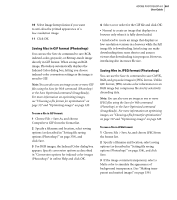Adobe 23101335 User Guide - Page 375
About file compression, Run Length Encoding RLE is a lossless
 |
UPC - 718659152833
View all Adobe 23101335 manuals
Add to My Manuals
Save this manual to your list of manuals |
Page 375 highlights
ADOBE PHOTOSHOP 6.0 365 User Guide For more information on choosing file formats when opening or saving images, see "Opening and importing images" on page 101 and "Saving images" on page 357. For information on choosing a Web optimization format, see "Choosing a file format for optimization" on page 317. Note: If a supported file format does not appear in the appropriate dialog box or submenu, you may need to install the format's plug-in module. For more information about specific file formats and plug-in modules, see "About file formats" in online Help. About file compression Many image file formats use compression techniques to reduce the storage space required by bitmap image data. Compression techniques are distinguished by whether they remove detail and color from the image. Lossless techniques compress image data without removing detail; lossy techniques compress images by removing detail. The following are commonly used compression techniques: • Run Length Encoding (RLE) is a lossless compression technique supported by Photoshop and some common Windows file formats. • Lemple-Zif-Welch (LZW) is a lossless compression technique supported by TIFF, PDF, GIF, and PostScript language file formats. This technique is most useful in compressing images that contain large areas of single color, such as screenshots or simple paint images. • Joint Photographic Experts Group (JPEG) is a lossy compression technique supported by JPEG, TIFF, PDF, and PostScript language file formats. JPEG compression provides the best results with continuous-tone images, such as photographs. When you choose JPEG compression, you specify the image quality by choosing an option from the Quality menu, dragging the Quality pop-up slider, or entering a value between 1 and 12 in the Quality text box. For the best printed results, choose maximum-quality compression. Files with JPEG encoding can be printed only on Level 2 (or later) PostScript printers and may not separate into individual plates. • CCITT encoding is a family of lossless compression techniques for black-and-white images that is supported by the PDF and PostScript language file formats. (CCITT is an abbreviation for the French spelling of International Telegraph and Telekeyed Consultive Committee.) • ZIP encoding is a lossless compression technique supported by the PDF and TIFF file formats. Like LZW, ZIP compression is most effective for images that contain large areas of single color. • (ImageReady) PackBits is a lossless compression technique that uses a run-length compression scheme. PackBits is supported by the TIFF file format in ImageReady only.















